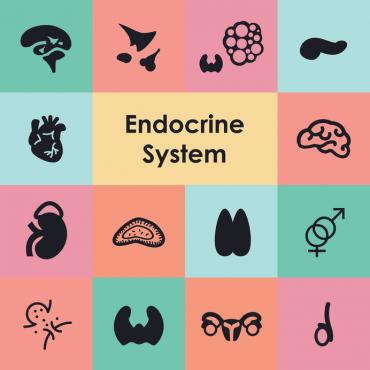Hormone health can be a complicated subject because there are several different organs and organ systems collaborating to regulate all the body’s hormones. A simplified review of this system could be explained as:
A system of organs working together to create, transport and regulate all the body’s different hormones. The major players in this system are the thyroid, pancreas, hypothalamus, pituitary, adrenals, ovaries, and testes. Hormones help to regulate our body’s energy production, organ development, physical growth and development, blood sugar control and other metabolic functions, response to stress, blood pressure, sexual functions including fertility, mood, and sleep.
What are the top 5 things to do for improved hormone health?
1. Walks in nature – Exercise outside near trees, away from car exhaust.
2. Buy organic groceries and shop locally from CSAs & farmer markets when possible.
3. Improve your indoor air quality and water quality – Get a water filter, air filter, open your windows and clean your air ducts.
4. Support your emotional & mental wellness – Manage stress, prioritize sleep
5. Avoid products with artificial scent or flavors and the ingredient ‘fragrance’.
There are many aspects of hormone health we could discuss. This article will focus on what chemicals and practices interfere with good hormonal balance and what we can do to support our hormone health.

What are endocrine disruptors?
Endocrine disruptors are “natural or human-made chemicals that may mimic, block, or interfere with the body’s hormones, which are part of the endocrine system” (NIH, 2023).
Because these chemicals affect our hormones, they can cause or contribute to a wide range of health issues including mood disorders, developmental disorders, obesity & other metabolic disorders, autoimmune disease, PCOS, infertility, and fatigue. Some known endocrine disruptors are:
Phthalates, PFAS, Bisphenol family (BPA, BPS, etc), Dioxins, Atrizine, Perchlorate, Phytoestrogens, Triclosan, Polychlorinated biphenyls (PCBs), and Polybrominated diphenyl ethers (PBDE).
*To find out what products these chemicals are used in visit:
https://www.niehs.nih.gov/health/topics/agents/endocrine/index.cfm
Is it okay to line baking sheets with aluminum foil to help with cleanup?
In short, not really. Best practice would be not to use aluminum when cooking or reheating food.
Studies have shown that aluminum leeches into food when heated. It’s especially important to not use aluminum with acidic products like tomatoes and citrus because these foods ‘collect’ the most aluminum. Foods like potatoes are least impacted by aluminum.
We know that aluminum prefers to travel to the brain to find a comfy place to stay over any other organs, meaning aluminum is neuro-toxic and even linked to dementia.
Try using unbleached parchment paper to line pans if needed or allow them to soak after use for easier cleaning.
If you need to use aluminum foil (like for covering a turkey in the oven), cover the food with parchment paper and then cover that with aluminum. This ensures the aluminum doesn’t touch the food. (The good news is that aluminum starts to off gas at very high temperature so as long as the food does not meet the metal, it is very unlikely to leech into your meal.)
Two good brands to try of unbleached parchment paper:
If You Care
Beyond Gourmet

Is it really important to avoid plastics?
Another short easy answer – Yes. But why?
Materials that fall into the category of plastics are:
Plastic in my face wash?!
Maybe so! Did you know that microbeads made from plastics are widely used as exfoliators in face wash?
Learn more about plastics in your personal care products –
https://www.beatthemicrobead.org/plastic-the-hidden-beauty-ingredient-2/
https://www.beatthemicrobead.org/wp-content/uploads/2022/06/Plastic-TheHiddenBeautyIngredients.pdf
4. Doesn’t the FDA test personal care products for safety?
According to toxicologist Dr. Yvonne Burkart, the FDA actually only demands testing of the pigments and dyes in make up and personal care products. All of ingredients are used at the discretion of the company.
This is why it’s so important to research the brands you use. If a company tests their products and uses high quality ingredients, they’ll likely brag about it. If you can’t find the inforamtion on the brands you use, take that as a big clue that it is not safe.
**One major ingredient to avoid when possible is ‘fragrance’. Fragrance almost always means phthalates are present in that product (think Glade plugins, candles, very strong smelling inexpensive perfumes, lotions and shampoos).
Check your products safety on the Environmental Working Groups database, Skin deep – ewg.org/skindeep
AND, on Made Safe’s database – https://madesafe.org/
Dr. Burkhart’s Instagram: https://www.instagram.com/dryvonneburkart/

What about cortisol?
Cortisol is a foundational hormone meaning if we have cortisol dysregulation, we’ll have impacts on other hormonal systems like thyroid, sex (testosterone, estrogen, etc.), and metabolic (insulin, leptin, ghrelin) hormones.
Ways to regulate cortisol are:
Go to bed and get up around the same time daily.
Take a walk, exercise or stretch inside, drink your coffee or tea in your yard, water your plants or tend to a garden if you have one, or read for 15 minutes outside.
This is a big one. We can manage our stress by walking & exercise, journaling, practicing deep breathing, quieting our mind, focusing on the present moment, and making a conscious intention to notice all the fun, humor, and joy we experience.
Where is your cup empty and how can you fill it? Are you over stimulated? Start to prioritize 5-10 minutes 2x/day to be alone in a quiet room without external stimuli.
What your body needs will shift based on your sleep, stress, cognitive load, movement, and current symptoms. However, in general, it is good to aim for:
I.e.: 1 Tbsp olive oil, ¼ cup nuts or olives, 2-3 Tbsp chia, flax or hemp seeds, ¼ avocado, 1 tsp butter/ghee, 4oz fatty fish like Salmon, herring, sardine or mackerel
Consider using an app like MyFitnessPal to add up your protein for 3 days to get an idea of your average intake.
Wellness Coach

